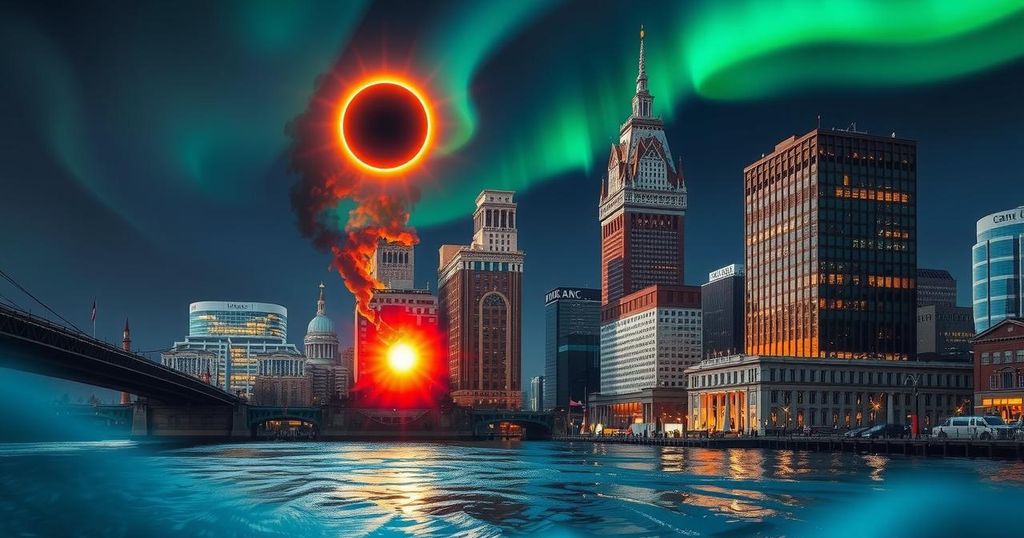Unprecedented Weather Events of 2024 in Philadelphia: A Year to Remember
The year 2024 in Philadelphia was characterized by extreme weather events including an earthquake, a solar eclipse, and sightings of the northern lights. Significant rainfall marked the beginning of the year, transitioning to warmer and drier conditions in the summer, ultimately declaring 2024 as the warmest year on record for the region. This unusual weather trend calls for a thorough understanding of climate impact and forecasting methods.
In 2024, Philadelphia experienced an array of unprecedented weather events, including an earthquake, a solar eclipse, and sightings of the northern lights, showcasing phenomena not commonly associated with the region. The year began with significant rainfall in January and proceeded with a notably warm and dry summer. As the year progressed, Philadelphia recorded the warmest October and had to contend with wildfires due to drought conditions. Ultimately, 2024 was declared the warmest year on record for the city, contributing valuable data for future weather forecasting.
January 2024 marked a particularly wet month, ranking as the fourth wettest in Philadelphia’s history, with nearly six inches of rain and the season’s first notable snowfall on January 19th. The month concluded with freezing rain contributing to icy conditions across the city. In February, however, snowfalls diminished significantly, leading to a mild temperate record. March experienced similar patterns, with the wettest day yielding over three inches of rain.
By April, the region felt a 4.8 magnitude earthquake, prompting extensive coverage from local media. Shortly thereafter, a solar eclipse near the end of the month caught public attention, reducing solar visibility by approximately ninety percent. Following a brief warm spell in April, May enticed residents with northern lights sightings, attributed to enhanced solar activity.
June introduced a scorching summer phase, hitting record high temperatures and marking the month as the fourth warmest recorded. Tornadic activity also emerged, characterized by a landspout tornado in Mercer County. Throughout July and August, the rising temperatures culminated in multiple days surpassing ninety degrees, while rainfall began to decrease significantly, leading to subsequent flooding in local areas.
The remainder of the year illustrated a stark contrast to typical weather patterns, especially in the fall. September maintained drier conditions, whereas October marked the driest month recorded in Philadelphia, with low precipitation leading to increased wildfire risks. As November began with rare warm temperatures, it led to a bone-dry period, only breaking the trend with light snow later in the month. Finally, December closed the year, reaffirming the record warmth, with the six warmest years referenced, all of which have occurred within the last twelve years.
Looking ahead to winter 2024-25, forecasts predict below-average snowfall, drawing on historical trends. The active solar phase indicates further opportunities for observing the northern lights in 2025, prior to the anticipated waning of solar activity. Philadelphians are encouraged to remain vigilant for potential celestial events as they unfold.
In summary, 2024 was characterized by unusual weather events in Philadelphia, highlighting the impact of climate patterns on regional weather experiences. The year showcased the interplay of warmth, drought, and significant celestial occurrences, leaving a lasting impression and providing critical insights for future forecasts.
The article reflects upon the significant weather events that occurred in Philadelphia throughout 2024, a year marked by extremes and remarkable phenomena. It traces the progression of weather from unusually wet winter conditions to extreme warmth during the summer months, including an earthquake and notable celestial events such as eclipses and the northern lights. This recounting serves to document and analyze how varying climate patterns have influenced local meteorological experiences, contributing to a broader understanding of climate trends over time.
In conclusion, the year 2024 served as a pivotal point for weather observations in Philadelphia, marked by extremes such as the warmest recorded temperatures and unique celestial displays. The range of weather-related events, from significant rainfall to the occurrence of the northern lights, underlines the need for ongoing monitoring and research into climate patterns. These deviations from historical norms emphasize the relevance of adapting forecasting models to future climatic conditions, as well as the importance of public awareness regarding environmental changes.
Original Source: www.fox29.com




Post Comment